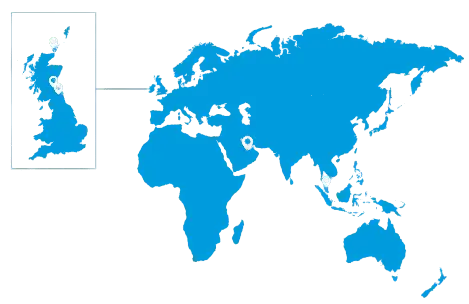Globalisation & Network Resilience Satellite Event
We are excited to announce details of the “Globalisation & Network Resilience” event, which will be a satellite of the Sunbelt 2024 Conference in Edinburgh.
The Globalisation & Network Resilience Satellite Event will take place on Tuesday 25th June 2024.
The deadline to submit a paper or extended abstract is 15th March 2024.
Accepted submissions to this satellite event will be invited to submit to a Special Issue of Global Networks on “Globalisation & Network Resilience”.
To participate in the Satellite Event, you will be required to register for the main Sunbelt conference.
Only PDF submissions will be considered, and you can submit here.
Satellite Organisers
The satellite organisers will also act as the guest editors for the Global Networks Special Issue.
- Matthew Smith ([email protected]), Associate Professor in Social Research Methods at Heriot-Watt University.
- Ekaterina Turkina ([email protected]), Professor in the Department of Entrepreneurship and Innovation at HEC Montreal.
- Matthew Mahutga ([email protected]), Professor of Sociology at University of California, Riverside.
Background
Globalisation patterns and economic integration have been a dominant feature of the world economy. However, recent geopolitical tensions and managing climate goals have impacted cross-border relations and the organisation of Global Value Chains (GVCs). Three major crisis and events that have impacted economic integration patterns are the outbreak of COVID-19, Russia’s invasion of Ukraine, and increasing tensions between the U.S. and China (Eichengreen, 2023). This has resulted in increased political pressures for “near shoring”, along with further discussion of how firms can make their global supply chains more resilient (Miroudot, 2020). Options available to firms include making supply chains more domestic and shorter (relying more on regional production), increasing diversity within the supply chain, and making them more digital (Gereffi, 2023). Yet resilience is a complex concept, with contrasting definitions at the country, firm, and supply chain level (Gereffi et al., 2022). Whilst patterns of deglobalisation are unlikely (Jaax et al., 2023), we are likely to witness a change to globalisation patterns. This change will also be fuelled by increased trade of services and the increased adoption of digital technologies in GVCs (Blázquez et al., 2023).
Many scholars describe the global economy as a set of networks to address research problems within international business and economics (Gorgoni et al., 2018; Kurt & Kurt, 2020). Economic systems can be viewed as a set of interdependent networks, including trade relations, flows of capital, FDI, multinational networks, ownership networks, production networks, and global supply chains (Schweitzer et al., 2009). Network analysis techniques, (from the Social Network Analysis (SNA) and Network Science) allow for an examination of the structural architecture of international systems (Sigler et al., 2021), allowing to comment on the key players in the system, along with international division of labour patterns (Mahutga & Smith, 2011). Network analysis also allows to investigate how a shock may propagate through an economic network and identify which players are most at risk (based on their network ties (Starnini et al., 2019; Sun et al., 2023).
Network resilience is an increasingly important topic within the field of SNA and Network Science (Lazega et al., 2022). Global crisis and geopolitical tensions in recent years have raised concerns about the resilience of interconnected economic systems. Network analysis techniques can provide insights on the resilience of a system, where certain network properties indicate whether a shock or crisis is likely to cascade throughout a system, or whether the system exhibits properties associated with systemic resilience (Ungar, 2018). Salient network properties to assess network resilience include diversity (number of categorical types in the system), redundancy (number of replicated pathways), and modularity (the extent to which the network is partitioned in modules or communities) (Ringsmuth et al., 2022).
The purpose of this event (and the Global Networks Special Issue) is to examine the interplay between network concepts of resilience and changing patterns of globalisation in the modern global economy. This event intends to stimulate research drawing on network analysis techniques to understand changes in globalisation patterns in recent years. It is expected that submissions will tackle various research problems, such as how are globalisation dynamics impacting economic networks? How are the network resilience properties of networks changing as a result of crisis in the modern global economy? Are there co-evolution patterns between globalisation dynamics and network resilience properties? Are network structures constant over periods of disruption, yet the roles of key actors (countries, companies) changing?
Call for papers
We welcome submissions exploring the link between globalisation and network resilience. Relevant areas include, but are not limited to, the following:
- Multinational enterprise networks
- Firm ownership networks
- Networks of service trade
- Digital trade networks
- International trade and investment networks
- Sectoral economic networks
- Global production networks
- Value Added networks
- Input-Output networks
- Financial networks
Submissions should utilise empirical network analysis (or network science) techniques.
We welcome full paper or extended abstract submissions.
Full paper submissions:
- This should be a single file that includes the main text, all tables and figures, and references.
- References may be submitted in any style or format, as long as it is consistent throughout the submission.
- Include all author details.
- Submissions should be no more than 9000 words, including references.
Extended abstract submissions:
- Extended abstracts should not exceed 3000 words, including references.
- Include all author details.
Only PDF submissions will be considered, and you can submit here.
Important dates:
- Submission deadline: 15th March 2024
- Communicate submission decision: 19th April 2024
References
Blázquez, L., Díaz-Mora, C., & González-Díaz, B. (2023). Slowbalisation or a “New” type of GVC participation? The role of digital services. Journal of Industrial and Business Economics, 50(1), 121–147. https://doi.org/10.1007/s40812-022-00245-x
Eichengreen, B. (2023). Globalization: Uncoupled or unhinged? Journal of Policy Modeling, 45(4), 685–692. https://doi.org/10.1016/j.jpolmod.2023.02.008
Gereffi, G. (2023). How to make global supply chains more resilient. Columbia FDI Perspectives. https://www.econstor.eu/handle/10419/268539
Gereffi, G., Pananond, P., & Pedersen, T. (2022). Resilience Decoded: The Role of Firms, Global Value Chains, and the State in COVID-19 Medical Supplies. California Management Review, 64(2), 46–70. https://doi.org/10.1177/00081256211069420
Gorgoni, S., Amighini, A., & Smith, M. (2018). Networks of International Trade and Investment: Understanding globalisation through the lens of network analysis. Vernon Press.
Jaax, A., Miroudot, S., & van Lieshout, E. (2023). Deglobalisation? The reorganisation of global value chains in a changing world. https://www.oecd-ilibrary.org/content/paper/b15b74fe-en
Kurt, Y., & Kurt, M. (2020). Social network analysis in international business research: An assessment of the current state of play and future research directions. International Business Review, 29(2), 101633.
Lazega, E., Snijders, T. A. B., & Wittek, R. P. M. (Eds.). (2022). A Research Agenda for Social Networks and Social Resilience. Edward Elgar Publishing Ltd.
Mahutga, M. C., & Smith, D. A. (2011). Globalization, the structure of the world economy and economic development. Social Science Research, 40(1), 257–272. https://doi.org/10.1016/j.ssresearch.2010.08.012
Miroudot, S. (2020). Reshaping the policy debate on the implications of COVID-19 for global supply chains. Journal of International Business Policy, 3(4), 430–442. https://doi.org/10.1057/s42214-020-00074-6
Ringsmuth, A. K., Otto, I. M., van den Hurk, B., Lahn, G., Reyer, C. P., Carter, T. R., Magnuszewski, P., Monasterolo, I., Aerts, J. C., & Benzie, M. (2022). Lessons from COVID-19 for managing transboundary climate risks and building resilience. Climate Risk Management, 35, 100395.
Schweitzer, F., Fagiolo, G., Sornette, D., Vega-Redondo, F., Vespignani, A., & White, D. R. (2009). Economic Networks: The New Challenges. Science, 325(5939), 422–425. https://doi.org/10.1126/science.1173644
Sigler, T., Martinus, K., Iacopini, I., Derudder, B., & Loginova, J. (2021). The structural architecture of international industry networks in the global economy. PLOS ONE, 16(8), e0255450. https://doi.org/10.1371/journal.pone.0255450
Starnini, M., Boguñá, M., & Serrano, M. Á. (2019). The interconnected wealth of nations: Shock propagation on global trade-investment multiplex networks. Scientific Reports, 9(1), Article 1. https://doi.org/10.1038/s41598-019-49173-2
Sun, X., Wei, Y., Jin, Y., Song, W., & Li, X. (2023). The evolution of structural resilience of global oil and gas resources trade network. Global Networks, 23(2), 391–411. https://doi.org/10.1111/glob.12399
Ungar, M. (2018). Systemic resilience: Principles and processes for a science of change in contexts of adversity. Ecology and Society, 23(4). https://www.jstor.org/stable/26796886


